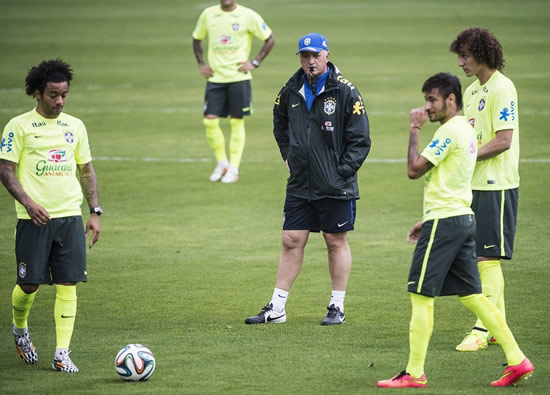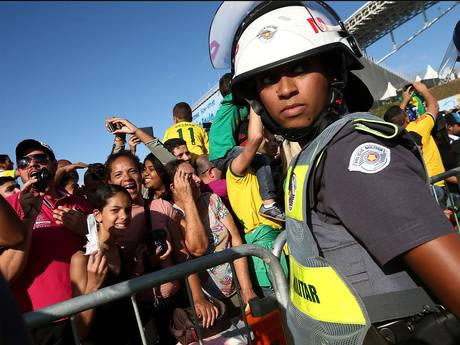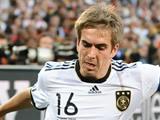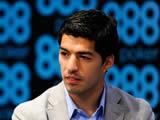World Cup 2014: Brazil side's fragility masked by bravado
Thursday, June 12, 2014 by Independent.co.uk
They are talking a good game as they prepare to kick off their tournament against Croatia, but there are reasons to be fearful
"So who do you fear a little? Perhaps the Argentines?" I asked Cafu, at an art exhibition celebrating sublime Brazilian football, set in the cool elegance of the Parque do Ibirapuera here, two evenings ago. "We fear no one. We will lose to no one," said a man who knows more about World Cup finals than any other Brazilian, having played in three and won two of them.
That is the Brazilians and their football team for you. There was a modicum of half-hearted talk about complacency in this city's newspapers, the term frio na garriga (butterflies in the stomach) cropped up and Tostao, one of the fabled class of Mexico 1970, spoke wisely by cautioning that Luiz Felipe Scolari's European-based players – strangers to many in this vast land – will be branded "mercenaries" if the country loses. But losing does not appear to come into the equation.
Part of the reason for that is Scolari – or "Felipao" as he is universally known here in the more elegant Portuguese articulation of "Big Phil". At a time in the four-year football cycle when the Brazilian manager traditionally comes under fire – Dunga was being crucified in 2010 for leaving Neymar at home – Scolari is seen as the saviour.
A craze for sporting Scolari fake moustaches is suddenly taking hold and, by virtue of giving the nation a hope that seemed entirely extinguished when they laboured under his predecessor Mano Menezes just two years ago, the 65-year-old is even more popular than when he managed Brazil to World Cup triumph 2002. The news that his nephew has died in a car crash only cemented the affection. One by one his players hugged him in training.
The bonhomie masks a genuine fragility about Brazil's hopes, though. Tostao's talk about mercenaries was wise because this squad has a serious image problem. Neymar is adored because he was so clearly betrothed to this city and to the Santos club, two hours away on the coast, where he stayed and played his way into national affections. Others, like David Luiz and the gifted midfielder Hulk, are strangers among their countrymen. Previous generations are not exactly helping erase the cynicism about the players having their noses in the trough. News here that Ronaldo, part of the 1994 champions, has an interest in the company which has sold the plastic seats that are in each of the new World Cup stadiums has done the team's image pitifully little good.
This is the reason why the World Cup group stage has been organised into a grand tour of the nation, taking in Brasilia and Fortaleza on the north-west coast: an arduous, 2,436-mile familiarisation project guaranteed to keep them away from the Maracana until the final. In contrast, Belgium will travel 430 miles.

Military police guard the team bus
"I will be flying, conquering the fans," Hulk said. He is winning the battle of the strangers more than most. His role in Brazil's Confederations Cup win last year – which suddenly reignited a belief that they can clinch this trophy too – has endeared him to the people. But others do not carry his popularity.
Hulk is also the one who has been creating the last-minute interest. He was depicted with his cartoon character's green body in one of the papers, and is valued for his ability to drop deep from his advanced midfield position, do the hard work and draw some of the responsibility and the opposition's attention away from Neymar – the team's fulcrum on whom a worrying amount rests.
"He is the best tactician in the offensive quarter," says one observer, and this country's obsession with World Cup partnerships views Neymar-Hulk as the all-important one rather than the more obvious notion of Neymar combining with the striker Fred to sweep all others aside.
But Neymar is the one on whom so much depends and that seems unenviable for any 22-year-old – even one with as much belief as him. "When you look back at the 2002 team, they had three great players," says the Brazilian journalist Rodrigo Mattos. "Now there is only Neymar. He is 22. He is only a boy but he has all the responsibility."
The national angst about him has reflected the heavy dependency on the folk hero these past few weeks. There were fully 20 pictures of Neymar in Wednesday's 12-page sports supplement of the Diario de Sao Paulo newspaper.
He looked more than boy when he arrived alongside Scolari for the first press conference of the tournament. The chemistry was formidable as they joked and joshed their way along, a highlight being the moment Neymar was asked to put a question of his choosing to the manager. "Professor, am I playing tomorrow? I want to go to sleep relaxed," he asked. "I'll think about it," Scolari replied. Neymar laughed when the lack of goals from a Brazil No 10 at a World Cup – the last one was Rivaldo's against England in 2002 – was mentioned. "You have to score a goal tomorrow," Scolari told him. "I hope it will be an easy goal. All you have to do is give it a kick."
Scolari was then asked if he would lose sleep if he was facing Neymar. "I might have thoughts of Neymar in my sleep but I would carry on sleeping," he answered. If last night was any guide, there was huge maturity from a player who said his first World Cup memories date from only 2002. "I don't want to be the best player in the World Cup. I want to win the World Cup," he added. "The time has arrived. The whole world us waiting. I hope we can help fulfil the dream of our nation."
Yet Brazilians also worry about the players they have lost. Though Spain's Diego Costa is the obvious one, no one has forgotten that two Brazilians – Eduardo da Silva and Sammir – are in Niko Kovac's Croatia squad who are the country's first opponents in the stadium here. Eduardo adorned a back page headlined "Fogo Amigo" (Friendly Fire).
That's not the only concern. A lot of talk has surrounded the Japanese referee for the match, Yuichi Nishimura, who also refereed the Brazil-Netherlands game in which Felipe Melo was sent off in the 2010 finals. Nishimura justifiably gave Melo his marching orders for a stamp but suspicion remains. There was definite racist innuendo contained in Diario de Sao Paulo's headline about the Asian: "Open your eyes." This is by no means a politically correct country.
At last, the pre-tournament phoney wars and fears can slip away. The Brazilians ought to be good enough to advance past their first opponents, though their awareness of what lies ahead was revealed by this week's training tactics. Scolari has had them working on small pitches, refining the slick, high-intensity one-twos – tabelas as they are known here – which will be part of the plan seen as a requirement to beat Croatia. The Balkan threat lies in Luka Modric and the team's speed and touch. Locals here have taken to calling them the "Brazilians from Europe" and discussing – perhaps more than necessary – the Efieto Croatia (the Croatia effect).
The fight for hearts and minds will not be an easy one. On your correspondent's one-hour drive out to the Arena da Sao Paulo this afternoon, there were only 12 Brazilian flags in evidence amid the hundreds of skyrise windows and a solitary wing-mirror flag was flying. The English nation is infinitely more excited. But then Brazil is digesting the incredible amounts of money which have been put into this tournament: 25.8bn Brazilian Reia (£6.8bn) – with a full 31 per cent on stadia which in at least three cities are not necessary.
They will tell you here that a sum of money like that would buy a huge facility to supplement Sao Paulo's beleaguered Hospital dos Clinicas, where you wait half an hour if you are an emergency case and eight hours if you are not.
Pele has called on the Brazilian nation not to put too much pressure on this team and not to let the protests create a mood of negativity towards the players. "Give them space. Let them play. Corruption and bribes in football has always been known to the Brazilian people. It has nothing to do with the team." said Pele. The nation will take some persuading. It may take a footballing tour de force to win them over.

Legends pay tribute to Gerrard & Lahm
International retirements follow Wo...
- Year
- Winner
- Runner-up
- Third place


